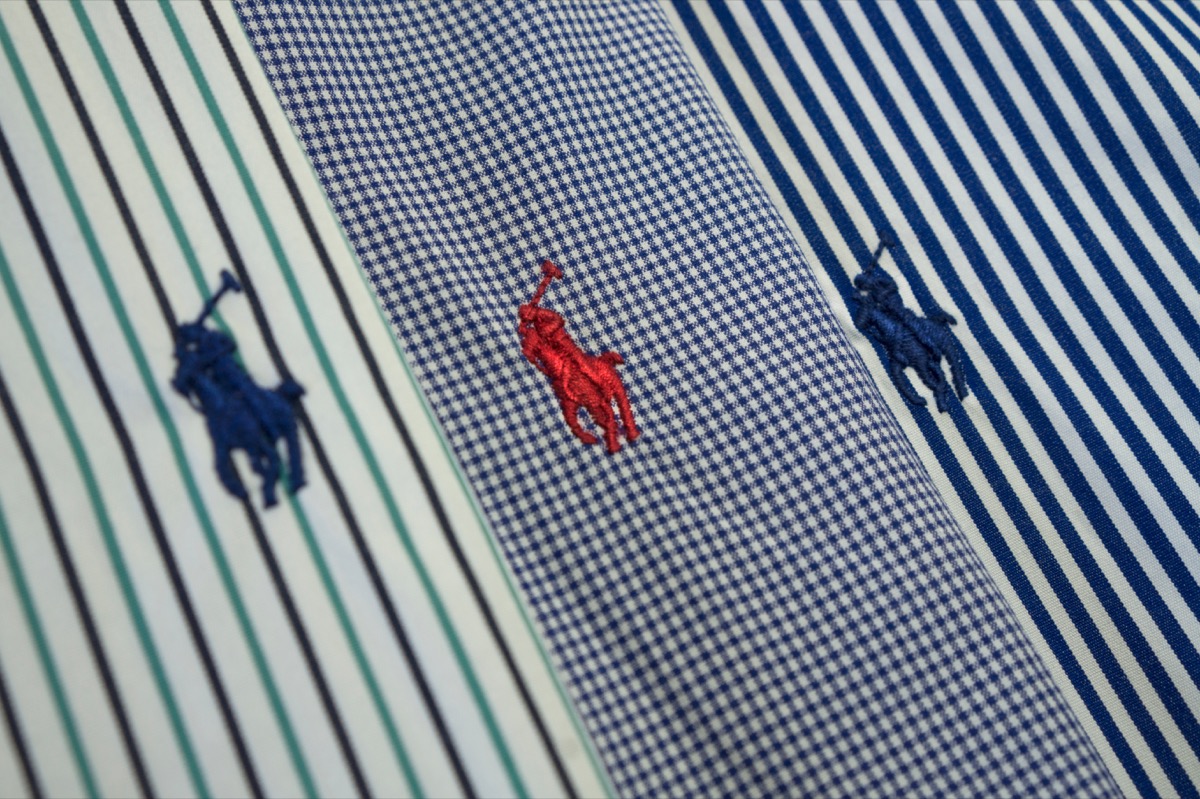If You Wear This, People Think You’re a Cheater, New Study Says

We all know you should never judge a book by its cover, but unfortunately not everyone has internalized that message. People are constantly judged for their their outward appearance, including the clothing and accessories they wear. The clothes you pick out every morning change the way others perceive you, down to some wild assumptions about your personal life. A recent study determined that wearing one thing in particular can lead people to think you’re a cheater, even if you’ve never strayed. Read on to find out if you’re sending the wrong message, and for ways your clothes could be helping you, Wearing This Color Instantly Makes You Less Attractive, Research Shows.
Men who wear shirts with large logos of luxury brands are seen as cheaters.

A study published April 15 in the journal of Personality and Social Psychology Bulletin underscored how men’s clothing is perceived by women. Study researcher Daniel Kruger, PhD, a psychologist from the University of Michigan, had 376 participants rate men wearing a Ralph Lauren polo with either a large logo or a small logo for a series of relationship factors. Factors included “flirts often,” “knowingly hits on someone else’s partner,” “good at taking care of children,” and “devotes most resources to supporting family.” The participants perceived men who wore large luxury logos as more promiscuous and more likely to cheat. In fact, these men were rated “lower on interest in long-term committed romantic relationships” and “higher on interest in brief sexual affairs,” according to the study. And for real cheating signs, If Your Partner Has These 4 Qualities, They’re More Likely to Cheat on You.
They are also seen as less invested in becoming a parent.

Kruger had originally hypothesized that large luxury logos would be more attractive to women, as this could be seen as a signifier of wealth and power, two traits important for reproduction and building a family. However, Kruger actually found that women see men who wear these types of shirts as individuals more invested in mating than in becoming a parent. “Rather than being a reliable and honest signal of future paternal investment, displays of luxury goods may sometimes represent investment in mate attraction, which is at the expense of future investment in offspring,” he explained in a statement. And for more useful information delivered straight to your inbox, sign up for our daily newsletter.
Smaller luxury logos made men seem more trustworthy.

According to Kruger, large luxury logos “enhance social competitiveness and mate attraction,” but small luxury logos had the opposite effect. The researcher said that small luxury logos “enhance perceptions of trustworthiness and reliability.” And men might realize this as well. Kruger also asked participants whether they would prefer wearing large or small logos in a series of scenarios. The male study respondents said they would be more likely to wear shirts with smaller logos when attending a job interview or meeting their partner’s parents for the first time, two situations where it is important to seem trustworthy. But in situations where they were more concerned with asserting social dominance—like in a leadership role or when attracting a mate—they said they were more likely to wear shirts with large logos. And for more subtle messages you’re sending out, Doing This With Your Hands Makes People Not Trust You, Experts Say.
In general, men are more likely to cheat than women.

While Kruger’s study was based solely on the perception that men wearing large logos are more likely to cheat, men are more likely to cheat than women in general. According to an extensive 2003 study published in AARP The Magazine, 46 percent of men admitted to having cheated on a partner in the past compared to just 21 percent of women. Another report from the Institute for Family Studies (IFS) found that married men were almost twice as likely to cheat on their spouse than married women were. According to this report, 20 percent of men admitted to having sex with someone other than their spouse compared to 13 percent of women. And for cheating signs you need to know, If Your Partner Is Asking You This One Question, They Could Be Cheating.